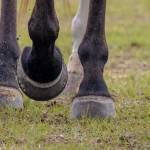Hoof Support: Biotin Supplementation in Horses

Among horse owners, biotin is the go-to supplement for hoof and hair growth. Biotin supports cell proliferation and the formation of enzymes that foster normal metabolism. The industrious microbes of the horse’s hindgut synthesize biotin in sufficient quantities that no documented evidence of biotin deficiency has been reported in horses. So, can supplemental biotin help hoof and hair growth if the body already produces it?
In a study of horses with poor hoof quality, daily supplementation of 20 mg of biotin for nine months improved hoof wall integrity but not growth rate.* Another study of Thoroughbred and Thoroughbred-cross horses reported an increase in the rate of hoof wall growth and hoof hardness when 15 mg of biotin was supplemented for 10 months.**
A study conducted in Europe followed horses for long periods from one to six years. Ninety-seven horses received 5 mg of biotin for every 100-150 kg (220-330 lb) body weight compared to a small control group of 11 horses. The supplemented horses showed improvement in hoof horn condition but no change in growth rate.+
Because biotin is produced by the horse, there is no defined dietary requirement. Aside from a high-quality biotin supplement, alfalfa hay is also a natural source of biotin. Oats, barley, and soybeans contain modest amounts of biotin as well.
Should you opt to supplement biotin, a dose of 15-20 mg (less for ponies) may be useful. Expect that it will take at least 6 to 9 months for any benefit to be detected in hoof quality because biotin only affects new growth. Biotin will not improve previously damaged hoof tissue. Be in it for the long haul, as once supplementation stops, often so do the benefits.+
Bio-Bloom PS, a supplement formulated by Kentucky Equine Research, provides 20 mg of biotin per serving, along with iodine, zinc, and the essential amino acid methionine, all included to optimize and support hoof health. In Australia, look for Bio-Bloom HF.
The medley of ingredients in the Bio-Bloom products sets them apart from other hoof supplements that contain only biotin. A recent study in Australia revealed that Bio-Bloom HF led to significantly increased hoof growth in winter, a season that typically brings about slower hoof growth. Over the 120-day study, horses fed Bio-Bloom HF had 15% more hoof growth than control horses.
Products like Bio-Bloom PS and Bio-Bloom HF should be fed to support hoof growth during times of nutritional, climatic, or athletic stress, such as high-performance horses that require regular trimming and shoeing, and horses with compromised hoof walls, like those with cracks, seedy toe, or multiple nail holes.
Contact a Kentucky Equine Research nutrition advisor to learn more about biotin and whether it’s appropriate for your horse.
*Josseck, H., W. Zenker, and H. Geyer. 1995. Hoof horn abnormalities in Lipizzaner horses and the effect of dietary biotin on macroscopic aspects of hoof horn quality. Equine Vet. J. 27:175-182.
**Buffa, E. et al. 1992. Effect of dietary biotin supplement on equine hoof horn growth rate and hardness. Equine Vet. J. 24:472-474.
+Geyer, H., and J. Schulze. 1994. The long-term influence of biotin supplementation on hoof horn quality in horses. Schweizer Archiv fur Tierheilkunde. 136(4):137-149.








